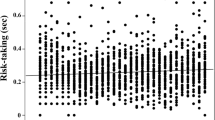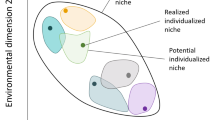Abstract
In behavioral ecology, diet selection is often predicted by using a theory in which it is assumed that behaviors have evolved to maximize the rate of intake of energy. In this theory, it is assumed that fitness is a monotonic function of energy intake. An alternative is to deal directly with fitness, measured in terms of expected reproduction, and thus connect short term behavior with reproduction. Following the usual assumptions of the theory of diet choice, fitness satisfies a partial differential-difference equation. Conditions under which rate maximizing and state variable theories of diet selection yield identical predictions are identified. When predation, as well as starvation, is a source of mortality, the identification is not as complete.
Similar content being viewed by others
Literature
Feller, W. 1971.An Introduction to Probability Theory and Its Applications, Vol. 2. New York: Wiley Interscience.
Gilliam, J. F. 1990. Hunting by the hunted: optimal prey selection by foragers under predation hazard. InBehavioural Mechanisms of Food Selection, R. Hughes (Ed.), pp. 797–820. Berlin: Springer-Verlag.
Godin, J-G. 1990. Diet selection under the risk of predation. InBehavioural Mechanisms of Food Selection, R. Hughes (Ed.), pp. 739–740. Berlin: Springer-Verlag.
Gray, R. D. 1987. Faith and foraging: A critique of the “Paradigm Argument from Design”. InForaging Behavior, A. C. Kamil, J. R. Krebs and H. R. Pulliam (Eds), pp. 69–140. New York: Plenum Press.
Houston, A. I. and J. McNamara. 1985. The choice of two prey types that minimises the probability of starvation.Behav. Ecol. Sociobiol. 17, 135–141.
Hughes, R. 1990 (Ed.).Behavioural Mechanisms of Food Selection. Berlin: Springer-Verlag.
Karlin, S. and H. M. Taylor. 1975.A First Course in Stochastic Processes. New York: Academic Press.
Lin, C. C. and L. A. Segel 1974.Mathematics Applied to Deterministic Problems in the Natural Sciences. New York Macmillan.
Ludwig, D. and L. Rowe. 1990. Life history strategies for energy gain and predator avoidance under time constraints.Am. Nat. 135, 686–707.
Mangel, M. 1989. Evolution of host selection in parasitoids: Does the state of the parasitoid matter?Am. Nat. 133, 688–705.
Mangel, M. and C. W. Clark. 1988.Dynamic Modeling in Behavioral Ecology. Princeton, NJ: Princeton University Press.
McNamara, J. M. 1992. Evolutionarily stable levels of vigilance as a function of group size.Anim. Behav., in press.
McNamara, J. M. and A. I. Houston. 1989. State-dependent contests for food.J. theor. Biol. 137, 457–479.
Peters, C. S. and M. Mangel 1990. New methods for the problem of collective ruin.SIAM J. appl. Math. 50, 1442–1456.
Pierotti, R. and C. A. Annett. 1990. Diet and reproductive output in seabirds.BioScience 40, 568–573.
Stephens, D. W. and J. R. Krebs. 1986.Foraging Theory. Princeton, NJ: Princeton University Press.
Author information
Authors and Affiliations
Rights and permissions
About this article
Cite this article
Mangel, M. Rate maximizing and state variable theories of diet selection. Bltn Mathcal Biology 54, 413–422 (1992). https://doi.org/10.1007/BF02464841
Received:
Revised:
Issue Date:
DOI: https://doi.org/10.1007/BF02464841




